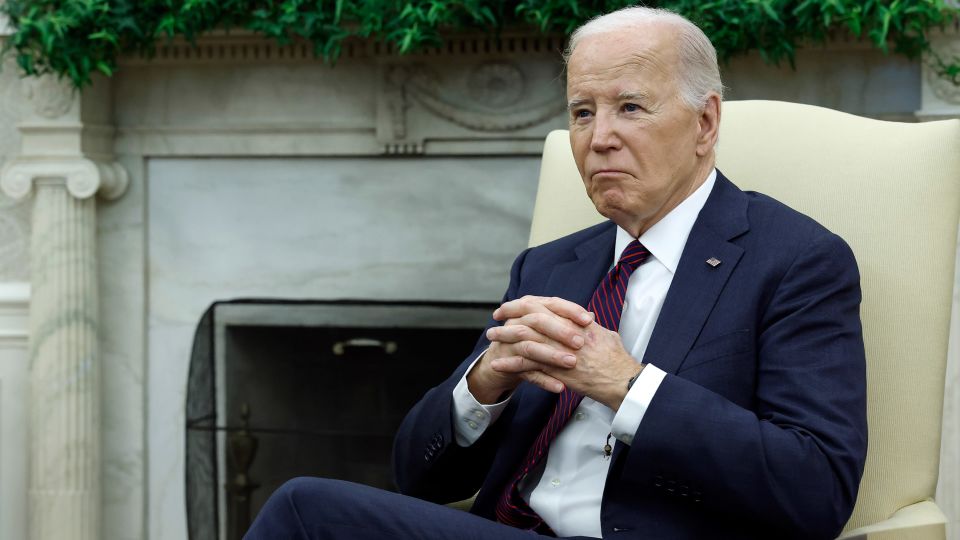The Department of Justice doubled down on its decision to not release the audio files of President Joe Biden’s interview with special counsel Robert Hur to House Republicans, stating that Republicans have not established a legitimate legislative purpose for demanding these recordings, in a new letter obtained by CNN.
The letter from DOJ Assistant Attorney General Carlos Uriarte to House Oversight Chair James Comer and House Judiciary Chair Jim Jordan sets up a showdown with Republicans who have continued to threaten holding Attorney General Merrick Garland in contempt of Congress for not releasing the audio recordings of the interviews Hur conducted with the president and his ghostwriter, Mark Zwonitzer.
The DOJ’s refusal to turn over the audio comes as Republicans find their impeachment inquiry into the president stalled now that the prospects of the investigation ending in impeachment are increasingly unlikely. Without the votes in their narrow majority or evidence of an impeachable offense, Republicans are now struggling with how to end their probe.
Uriarte argued that DOJ has extensively cooperated with the committees, noting that the department has already turned over the transcripts of the interviews Biden and his ghostwriter had with the special counsel, which would address Republican allegations made about the president as part of their impeachment inquiry.
“It seems that the more information you receive, the less satisfied you are, and the less justification you have for contempt, the more you rush towards it,” Uriarte wrote.
CNN has reached out to spokespeople for Comer and Jordan.
Raising concerns that Republicans want these audio files for political purposes, he added: “the Committees’ inability to identify a need for these audio files grounded in legislative or impeachment purposes raises concerns about what other purposes they might serve.”
The department called out Comer specifically, stating that he has not gone to view classified documents in Hur’s case made available to him by DOJ two months ago despite persistent claims they are crucial to his investigation into Biden.
“The Chair of the Oversight Committee has not yet taken us up on our offer,” Uriarte wrote, referring to two classified documents cited in Hur’s report on a call then-Vice President Biden had with then-Ukrainian Prime Minister Arseniy Yatsenyuk in December 2015 that DOJ has made available for Republicans to review.
Yet on Fox News earlier this month, Comer alleged these documents “may have been part of the influence peddling schemes that his family was involved in, and we need all of that evidence including the audio tape to be able to complete our investigation”
In the letter, DOJ also goes into extensive detail about how the specific privacy concerns related to an audio recording of an interview are distinct from those of a written transcript, and how the release of such an audio file could dissuade cooperation from future witnesses in criminal investigations.
Comer and Jordan have demanded the audio recordings in part because they argue the audio files are “materially different from the transcripts, offering a unique and invaluable medium of information that capture vocal tone, pace, inflections, verbal nuance and other idiosyncrasies.”
In response, Uriarte stated, “these generic characterizations of audio files lack any connection to the Committees’ articulated purposes” but acknowledged that the audio files contain sensitive law enforcement information and need to be protected.
“As courts have recognized, the privacy interest in one’s voice—including tone, pauses emotional reactions, and cues—is distinct from the privacy interest in a written transcript of one’s conversation,” Uriarte wrote.
Uriarte pointed to the possibility that audio files can be manipulated through “cutting, erasing, and splicing” in a way that increases the privacy concerns of the witness. Highlighting that the department obtained voluntary agreement from Biden and Zwonitzer to be interviewed, and for those interviews to be recorded, Uriarte argued that releasing such audio files now could impact how a witness answers questions and “reduce the willingness of an interview subject to cooperate if they believe their audio file could be made publicly available” going forward.
Uriarte therefore accused Republicans of going after these audio files for the wrong reasons.
“The Committees have demanded information you know we have principled reasons to protect, and then accused us of obstruction for upholding those principles. This deepens our concern that the Committees may be seeking conflict for conflict’s sake” he wrote.
For more CNN news and newsletters create an account at CNN.com
